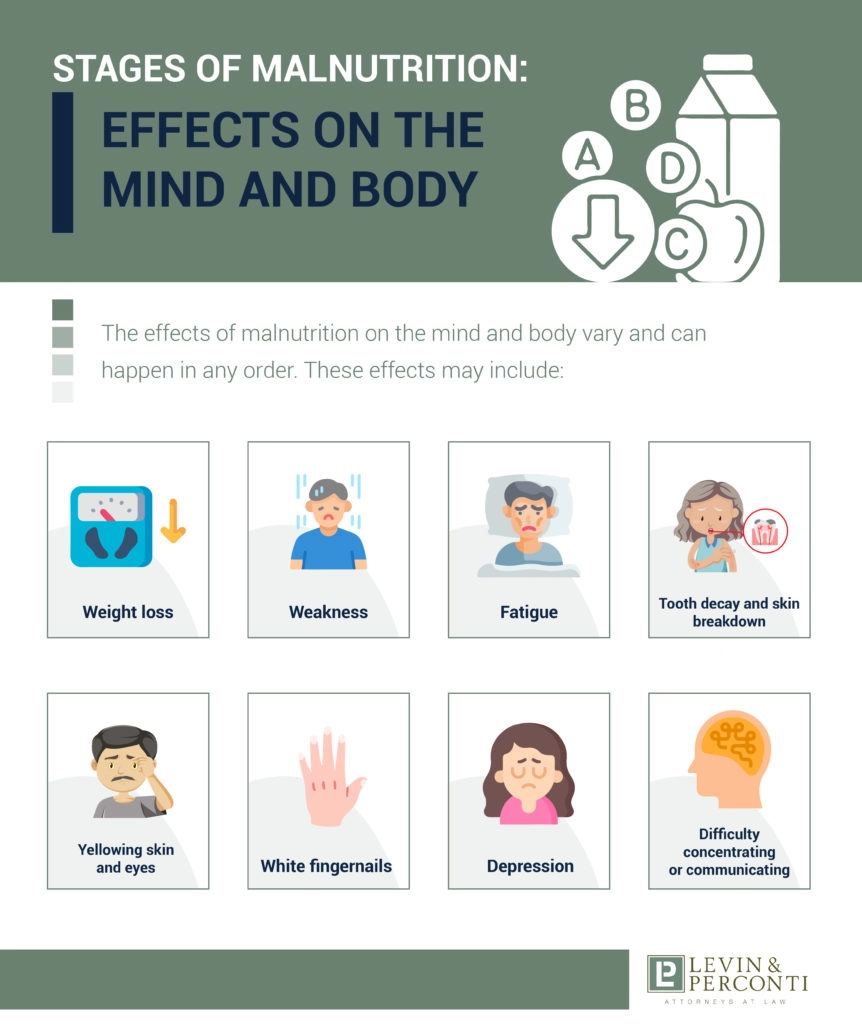Nursing Home Malnutrition and Dehydration
If you suspect that your loved one is undernourished or dehydrated as a result of nursing home abuse or neglect, contact the attorneys at Levin & Perconti. We’ll help you take the next steps to ensure proper care and hold those accountable who aren’t meeting the basic needs of your loved one.
- How Can Levin & Perconti Help?
- What Is Malnutrition?
- Stages of Malnutrition: Effects on the Mind and Body
- What Is Dehydration?
- Stages of Dehydration: Warning Signs and Symptoms
- Frequently Asked Questions (FAQs)
- Are Seniors More Likely to Suffer From Dehydration?
- Common Causes of Nursing Home Malnutrition and Dehydration
- Dangers of Nursing Home Malnutrition and Dehydration
- Identifying Signs of Malnutrition or Dehydration
How Can Levin & Perconti Help?
Nursing home abuse and neglect can be difficult to prove. If you suspect your loved one is dehydrated or malnourished because of inadequate care at a nursing home, ask an attorney to look at the facts of your potential case to determine the best course of action.
Our team of Chicago nursing home abuse attorneys at Levin & Perconti can help you understand nursing home laws and determine how they relate to your circumstances. Nursing home facilities don’t always follow the law, and we can be a powerful resource to help achieve justice and compensation on your loved one’s behalf
Our compassionate and knowledgeable lawyers have won millions of dollars in settlements and verdicts for our clients. Some nursing home malnutrition and dehydration cases won by Levin & Perconti include:
$1.0 Million
Settlement
against a nursing home for a 75-year-old resident who suffered malnutrition, dehydration and Stage IV pressure sores, resulting in death.
$950,000
Settlement
for a 91-year-old nursing home resident who over a three year period suffered from malnutrition and dehydration sustaining a body loss of 1/3 of her total weight within the last three months, causing a hospitalization and death.
$925,000
Settlement
on behalf of the family of an 86-year-old nursing home resident who was so badly neglected that she became malnourished and dehydrated, and developed severely infected bed sores that caused an infection in her bone and in her blood, and resulted in her death.
$900,000
Settlement
against a nursing home that failed to appropriately feed and hydrate a 76-year-old resident, leading to his malnutrition, dehydration and death.
$750,000
Settlement
for the family of an 80 year old Parkinson’s nursing home resident with dementia who developed Stage IV pressure sores, dehydration and malnutrition resulting in hospitalizations and death.
$800,000
Settlement
against a Chicago nursing home for failing to appropriately monitor an 88-year-old patient’s hydration levels after a fall, causing severe pain, appetite loss, severe dehydration and death.
Testimonials
What Is Malnutrition?
Malnutrition refers to deficiencies, excesses, or imbalances in energy or nutrient intake. In nursing homes, malnutrition is often due to a deficiency in the caloric intake needed to maintain health.
Stages of Malnutrition: Effects on the Mind and Body
The effects of malnutrition on the mind and body vary and can happen in any order. These effects may include:
- Weight loss
- Weakness
- Fatigue
- Dental decay
- Yellowing skin
- White fingernails
- Depression
- Difficulty concentrating or communicating
Awareness of the signs of malnutrition is important. Often, by the time you’re able to detect malnutrition, its effects have already taken a toll on the body, impacting the blood, tissues, and metabolic processes. However, when discovered early, some of the long-term adverse effects can be stopped.
What Is Dehydration?
Dehydration occurs when the loss of body fluids, mostly water, is greater than the amount of water or fluids taken in. We lose water when breathing, sweating, and using the bathroom. If we lose too much water, our bodies can become dehydrated.
Stages of Dehydration: Warning Signs and Symptoms
Dehydration ranges from mild to severe. Signs of mild or moderate dehydration might include:
- Increased thirst
- Dry mouth
- Lethargy
- Lower urine output
- Weaker and darker urine output
- Headache or dizziness
- Dry skin
- Inability to produce tears
Symptoms of severe dehydration include:
- Little to no urine output
- Urinary tract infections (UTIs)
- Urine that is dark yellow or amber
- Dizziness that affects walking
- Low blood pressure
- Fever
- Seizure
- Shock
- Kidney failure
Adults who experience any of these symptoms should seek immediate medical care.
Frequently Asked Questions (FAQs)
If you have a loved one who has been harmed or has died because of nursing home neglect or abuse that resulted in malnutrition and dehydration, you may have questions.
This is best determined by your loved one’s physician and nursing home staff when formulating a care plan at the time of admission. Certain patients are at higher risk for these conditions based on their age or physical and mental needs. Your loved one’s care plan should be consistently reassessed and adjustments should be made throughout their stay to address any specific needs or particular risks.
To report suspected abuse in a nursing home, you can call the Illinois Department of Health’s Nursing Home Complaint Hotline at 1-800-252-4343.
You should also contact a nursing home abuse attorney who can help guide you as you seek justice for your elderly loved one and family.
In Illinois, the statute of limitations for wrongful death or nursing home injury is two years from the date of death or the date of the incident that caused the injury.
Timing considerations can be impacted by a variety of factors, but they are vital when pursuing your case. Contact a nursing home lawyer as soon as possible to determine whether you have a valid case against a nursing home on behalf of your loved one.
Are Seniors More Likely to Suffer From Dehydration?
Dehydration more often affects seniors. One study found that it’s among the top ten reasons for hospitalization of elderly adults. With age, many older people find it more difficult to recognize when they’re thirsty, or they may have a fear of falling that prevents them from hydrating adequately to avoid having to get up to access the bathroom. In addition, biological changes within the body resulting in water, salt, and electrolyte imbalances naturally occur as people get older.
Dehydration can also be caused by impairments or disabilities that make the physical act of drinking difficult. Those with mental impairments like dementia may forget to drink altogether, making adequate hydration challenging.
Lastly, many medications used to treat various health conditions that often affect elderly people can lead to dehydration. Medical conditions themselves, such as diabetes, diarrhea, and fever can also result in reduced hydration.
Common Causes of Nursing Home Malnutrition and Dehydration
The physical or psychological causes for malnutrition and dehydration can include illness, adverse drug effects, food and drug interactions, and swallowing disorders.
Sometimes malnutrition and dehydration stem from environmental factors associated with living in a nursing home. These factors can include:
- Inadequate attention from staff or understaffing
- Lack of individualized care
- Poor staff training in proper ways to assist with eating and drinking
- High staff turnover rates
- Reliance on liquid supplements
- Unappetizing or cold food
- Unpleasant dining environment
- Absence of fresh water within easy reach
- Lack of oral care
Any or all of these causes can contribute to dehydration and malnutrition. The long-term results of this kind of inadequate care can be very harmful.
Dangers of Nursing Home Malnutrition and Dehydration
When lacking proper nutrition and fluids, a nursing home patient could experience increased infections, confusion, and muscle weakness. These symptoms can result in immobility, falls, ulcers, pneumonia, and a suppressed immune system.
When malnutrition and dehydration are left unchecked, they can result in major medical events such as organ failure, stroke, heart attacks, or even death.
Identifying Signs of Malnutrition or Dehydration
Nursing home staff is responsible for providing residents with adequate nutrition. If you notice your loved one is beginning to show signs of dehydration or malnutrition, the nursing home may be held accountable.
Signs to watch for to determine if your loved one is receiving adequate care, nutrition, and fluids include the following:
- Unintentional weight loss
- Decreased muscle mass
- Lightheadedness or dizziness
- Confusion
- Lack of balance, falls, or fainting spells
- Fatigue, weakness, or sluggishness
- Inability to stay warm
- Dry skin
- Constipation or diarrhea
- Dry mouth or difficulty swallowing
- Thirst
- Mouth sores and swollen or bleeding gums
- Recurrent infections
- Nausea
- Bloated abdomen
Malnutrition and dehydration are serious and life-threatening conditions that require immediate attention. Report any unaddressed concerns you may have to the proper authorities, such as social services or a long-term care ombudsman. If a related injury occurs, contact an attorney.
If you think your loved one is suffering or has died because of nursing home neglect that led to malnutrition and dehydration, contact the lawyers at Levin & Perconti today for a free, no-obligation consultation. Our top-notch client care has earned us a place on several best lawyer lists, including the Illinois Top 100 lawyer list and Best Lawyers in America.
Legally Reviewed by

Steven M. Levin
Contact Us
- Free Consultation
- (312) 332-2872
"*" indicates required fields
Related Pages
- Alzheimer's Disease
- Bed Sores
- Broken Bones
- Chemical Restraints
- CILA Group Home Abuse
- Elder Abuse
- Falls
- Financial Exploitation
- Inadequate Training
- Malnutrition & Dehydration
- Medication Errors
- MRSA
- Overmedication
- Physical Restraints
- Poor Hygiene
- Sepsis
- Sexual Assault
- Understaffing
- Wandering & Elopement
- Wrongful Death
Notable Results
VERDICT
on behalf of an 85-year-old woman injured in a nursing home when her medications were mismanaged.
VERDICT
for the estate of a 67-year-old man who died from complications related to a fall
SETTLEMENT
for a 59-year-old resident who developed multiple painful and infected bedsores which took four years to heal.
FAQs
- What are the warning signs of nursing home abuse?
- What are the four stages of bedsores?
- How much is a bedsore lawsuit worth?
- How long does it take to get bedsores?
- Can you die from bedsores?
- What are the three stages of sepsis?
- How can nursing home falls be prevented?
- Are bedsores preventable?
- What Is nursing home liability insurance?
Our Office
325 N LaSalle Dr Suite 300
Chicago, IL 60654
312-332-2872
